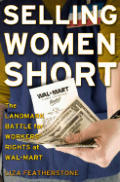
Yesterday I found an interesting book on the treatment of Wal-Mart towards women, especially from the minority community. It talks about the sex-discrimination at Wal-Mart, and the way these women stick on to jobs for want of better prospects. But promotions elude them, and good positions often go to the men, who are often paid more. Interestingly one women (I don’t remember the name) had to show her monthly bills and expenses in order to justify her higher pay requests. Humiliating no doubt, it shows the state of affairs in the most developed economy, and in the company that tops the fortune 500. high sales means higher revenues for the shareholders, but lower prices leads to lower pay scales. Its indeed unfortunate to find that in an economy, which had a women’s liberation long back, still struggles with such discrimination. Racial discrimination is rampant in these parts, but such things are often uncalled for.
Probably Sam Walton didn’t start this chain with such a philosophy. The well proclaimed pride associated with being a part of the Sam’s club didn’t go well with all the members. Most of them are exploited, and are often forced to continue with the job. The recent report of not even allowing any lunch breaks has added to the existing list of court cases against Wal-Mart. The US government should take some steps to protect the women's rights.

